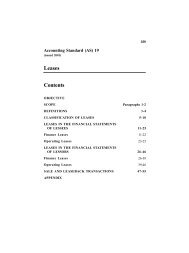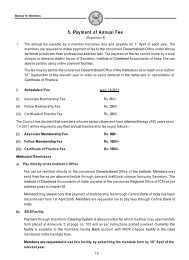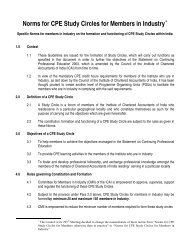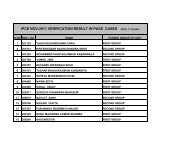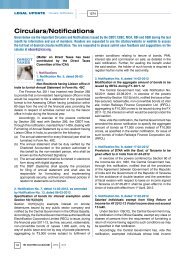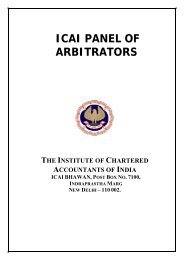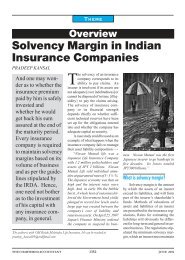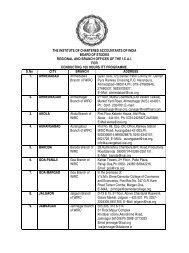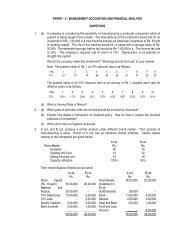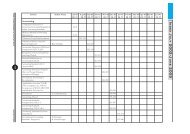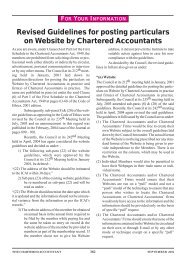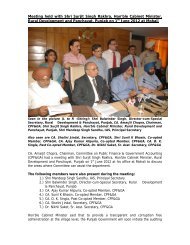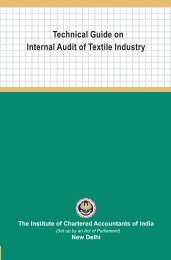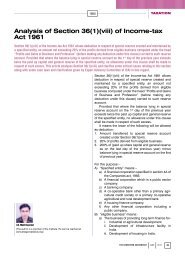The Chartered Accountant
The Chartered Accountant
The Chartered Accountant
Create successful ePaper yourself
Turn your PDF publications into a flip-book with our unique Google optimized e-Paper software.
LEGAL UPDATE<br />
C.I.T., 1995 (127) CTR (Bom) 395 and held that since<br />
the returns filed by the assessee on 13/3/1992 were<br />
regularised subsequent to issue of notice under Section<br />
148, the precondition of disclosure of income before<br />
issue of notice under Section 273A was not fulfilled<br />
and thereby not gone into the merits of matter. But<br />
the Commissioner failed to consider that in that case<br />
returns for three years were true and complete out of<br />
eight years returns and therefore, the court refused to<br />
interfere with the said order. However, in the instant<br />
case the Commissioner, wrongly overlooked the judgment<br />
passed in B.R.Sound-N-Music vs. O.P.Bhardwaj<br />
and another 1988 (173) ITR 433 passed by this court<br />
against which the Special Leave Petition was dismissed<br />
by the Supreme Court. In B.R.Sound-N-Music’s case<br />
(supra) it is specifically observed that Section 273A(1)<br />
(a) requires a disclosure of full and true income and<br />
not the filing of valid returns in time before issue of<br />
notice under Section 139(2) or Section 148. It is necessary<br />
for the commissioner to take into consideration<br />
all the material available on the record.<br />
Hence, the order passed by the Commissioner was<br />
quashed and set aside.<br />
Section 37(1) read with Section 145 of the Income-tax Act, 1961 – Business Expenditure – In which year it is<br />
allowable [Assessment Year 1998-1999]<br />
Allowability of the sum provided under the head “salaries and wages”, pending revision<br />
Central Government Employees Consumer Cooperative Society Limited v. Commissioner of Income Tax<br />
(Delhi), 19 September, 2008<br />
<strong>The</strong> assessee had provided for a sum under the head<br />
“salaries and wages”, pending revision. <strong>The</strong> Assessing<br />
Officer found that the liability had been provided<br />
for in relation to wage revision implemented with effect<br />
from 01.07.1997. But, the liability on account of<br />
wage revision had not been ascertained and had not<br />
accrued during the year which ended on 31.03.1998.<br />
<strong>The</strong> Assessing Officer disallowed it for the assessment<br />
year 1998-1999. <strong>The</strong> assessee placing reliance<br />
on Accounting Standard 4 issued by the Institute of<br />
<strong>Chartered</strong> <strong>Accountant</strong>s of India contended that note<br />
of significant events occurring after the balance sheet<br />
date was required to be taken.<br />
<strong>The</strong> High Court observed that although the Tribunal<br />
took the view that no notification had been issued by<br />
the Central Government indicating the approval to<br />
Accounting Standard 4 in terms of Section 145(2),<br />
the Tribunal discussed the applicability of Accounting<br />
Standard 4 itself and concluded that the same<br />
was not, in any event, applicable in the facts of the<br />
present case. On facts, the Tribunal observed that in<br />
the case of the assessee the condition existing on the<br />
balance sheet date, i.e., on 31.03.1998 was, at best,<br />
the revision of pay being contemplated with effect<br />
from 01.07.1999. <strong>The</strong> Tribunal further observed that<br />
there was no indication of any revision of the pay<br />
scales payable by the assessee for the year 01.07.1997<br />
to 31.03.1998. Consequently, the Tribunal returned<br />
a finding of fact that the liability itself had been incurred<br />
by the assessee only during the financial year<br />
1998-1999. <strong>The</strong> High Court therefore held that the<br />
decision arrived by the Tribunal was correct in law.<br />
<strong>The</strong> appeal was dismissed.<br />
Section 273 read with Section 215 of the Income-tax Act, 1961— Penalty – False estimate of, or failure to pay,<br />
advance tax [Assessment Year 1979-80 and 1980-81]<br />
For imposing penalty, mens rea on the part of assessee would have to be shown<br />
Commissioner of Income Tax, Ahmedabad v. Sarabhai Holdings Pvt. Ltd (Supreme Court), 21 October, 2008<br />
<strong>The</strong> assessee followed the Mercantile System of Accounting.<br />
<strong>The</strong>re was an agreement whereby the assessee<br />
agreed to transfer its industrial undertaking<br />
and business activity in favour of the assessee’s own<br />
subsidiary X. <strong>The</strong> agreement provided for an interest<br />
clause, which was agreed at the rate of 11% per<br />
annum and that it would be payable on balance sale<br />
consideration which would remain unpaid from time<br />
to time. X transferred the undertaking to Y and wrote<br />
a letter on 15.6.1978 to the assessee proposing modification<br />
in terms of payment and requested, inter alia,<br />
that the interest be charged on deferred sale consideration<br />
from 1.7.1979 instead of 1.3.1977. Accordingly,<br />
a Resolution dated 30.6.1978 was passed, doing away<br />
with the requirement of payment of interest. <strong>The</strong> assessee<br />
claimed waiving of interest as a natural corollary<br />
of the Resolution dated 30.6.1978. However, the<br />
assessee was asked to pay advance tax. <strong>The</strong> assessee<br />
filed an estimate, showing nil amount of advance tax<br />
payable. <strong>The</strong> Assessing Officer levied interest under<br />
Section 215 on a finding that the assessee had failed to<br />
pay advance tax. <strong>The</strong> Assessing Officer also directed<br />
THE CHARTERED ACCOUNTANT 999 DECEMBER 2008



